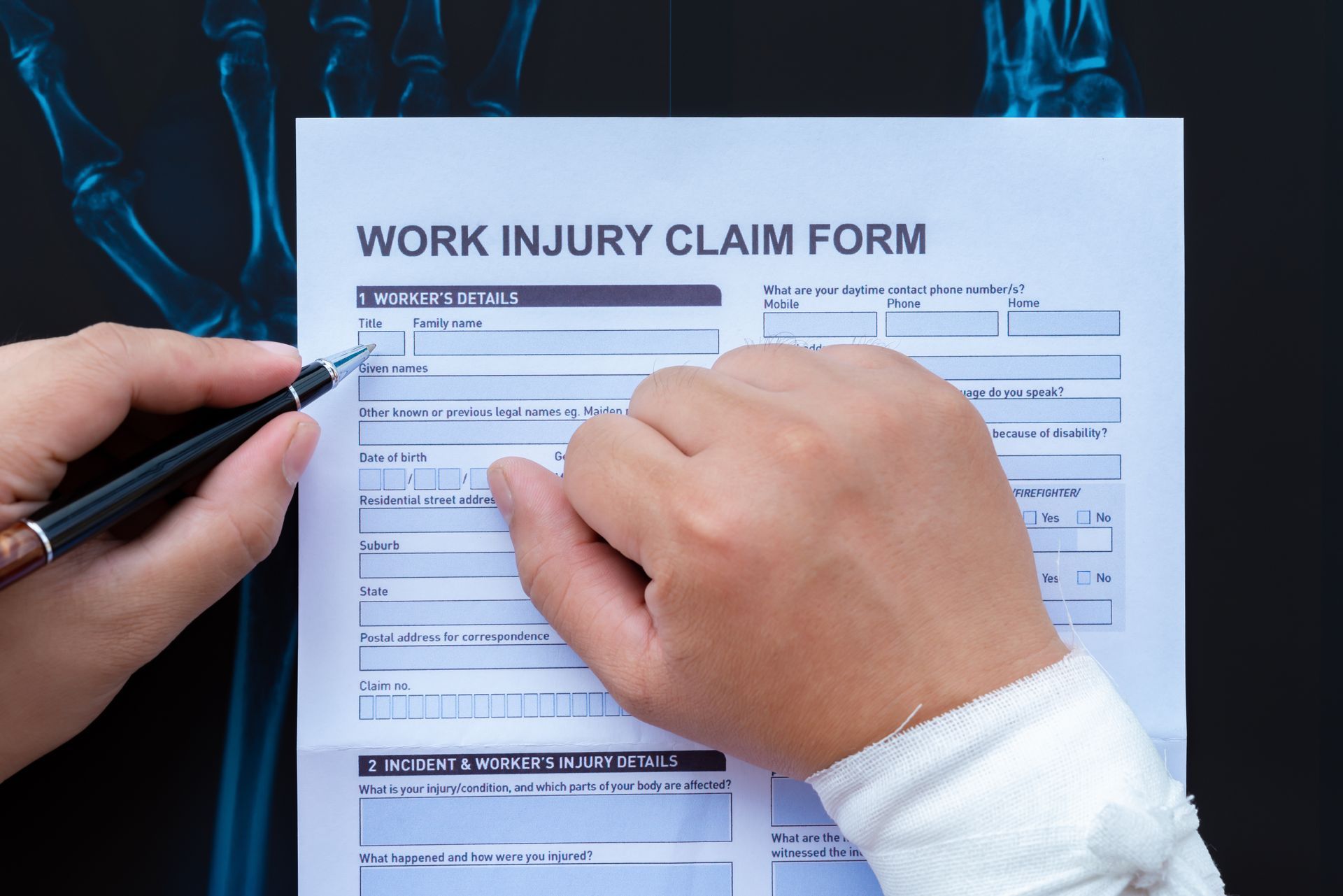Can I Sue My Employer for a Workplace Injury?
Viewer Discretion Advised
This blog discusses workplace injuries, legal options, and potentially distressing topics related to harm on the job. Some readers may find the content triggering, especially if they’ve experienced a recent workplace accident or injury. Please note that this post is for educational purposes only and no individuals were harmed in the creation of any images or examples used. Reader discretion is advised.
If you or someone you know has been injured at work, seek pofessional support immediately.
Viewer Discretion Advised
This blog discusses workplace injuries, legal options, and potentially distressing topics related to harm on the job. Some readers may find the content triggering, especially if they’ve experienced a recent workplace accident or injury. Please note that this post is for educational purposes only and no individuals were harmed in the creation of any images or examples used. Reader discretion is advised.
If you or someone you know has been injured at work, seek pofessional support immediately.
Understanding Your Rights
After Getting Hurt on the Job in Arizona

Can I Sue My Employer
for a Workplace Injury?
Getting hurt on the job can be overwhelming. Medical bills, missed paychecks, and the stress of recovery can make it hard to know where to turn. One common question is: Can I sue my employer for a workplace injury?
The short answer is: usually no—but there are exceptions. Most workers in Arizona are covered by workers’ compensation. However, under certain conditions, you may still have the right to file a lawsuit.
Can I Sue My Employer
for a Workplace Injury?
Getting hurt on the job can be overwhelming. Medical bills, missed paychecks, and the stress of recovery can make it hard to know where to turn. One common question is: Can I sue my employer for a workplace injury?
The short answer is: usually no—but there are exceptions. Most workers in Arizona are covered by workers’ compensation. However, under certain conditions, you may still have the right to file a lawsuit.

Can I Sue My Employer
for a Workplace Injury?
Getting hurt on the job can be overwhelming. Medical bills, missed paychecks, and the stress of recovery can make it hard to know where to turn. One common question is: Can I sue my employer for a workplace injury?
The short answer is: usually no—but there are exceptions. Most workers in Arizona are covered by workers’ compensation. However, under certain conditions, you may still have the right to file a lawsuit.


What Is Workers’ Compensation?
In Arizona,
workers’ compensation is a no-fault system designed to help employees who are injured on the job. It covers:
- Medical expenses
- Lost wages
- Rehabilitation or therapy
- Disability benefits
If your employer carries workers’ comp insurance (as required by law), you typically cannot sue them. Instead, you must file a claim through the workers’ compensation system.

What Is Workers’ Compensation?
In Arizona,
workers’ compensation is a no-fault system designed to help employees who are injured on the job. It covers:
- Medical expenses
- Lost wages
- Rehabilitation or therapy
- Disability benefits
If your employer carries workers’ comp insurance (as required by law), you typically cannot sue them. Instead, you must file a claim through the workers’ compensation system.

When Can You Sue Your Employer?
There are a few
exceptions where you
might be able to file a personal injury lawsuit against your employer:
- Intentional Harm:
If your employer intentionally caused your injury (not just negligence), you could have a case. These situations are rare and hard to prove but possible. - No Workers’ Compensation Insurance:
If your employer doesn’t carry workers’ compensation (which is illegal), you may be able to file a personal injury lawsuit directly against them. - Third-Party Lawsuits:
While you usually can’t sue your employer, you can sue a third party who caused your injury. For example:
a. A subcontractor on a construction site
b. The manufacturer of faulty equipment
c. A driver who hit you while you were working
When Can You Sue Your Employer?
There are a few
exceptions where you
might be able to file a personal injury lawsuit against your employer:
- Intentional Harm:
If your employer intentionally caused your injury (not just negligence), you could have a case. These situations are rare and hard to prove but possible. - No Workers’ Compensation Insurance:
If your employer doesn’t carry workers’ compensation (which is illegal), you may be able to file a personal injury lawsuit directly against them. - Third-Party Lawsuits:
While you usually can’t sue your employer, you can sue a third party who caused your injury. For example:
a. A subcontractor on a construction site
b. The manufacturer of faulty equipment
c. A driver who hit you while you were working

When Can You Sue Your Employer?
There are a few
exceptions where you
might be able to file a personal injury lawsuit against your employer:
- Intentional Harm:
If your employer intentionally caused your injury (not just negligence), you could have a case. These situations are rare and hard to prove but possible. - No Workers’ Compensation Insurance:
If your employer doesn’t carry workers’ compensation (which is illegal), you may be able to file a personal injury lawsuit directly against them. - Third-Party Lawsuits:
While you usually can’t sue your employer, you can sue a third party who caused your injury. For example:
a. A subcontractor on a construction site
b. The manufacturer of faulty equipment
c. A driver who hit you while you were working

Why It Matters
Filing a workers’ comp claim can help you recover benefits quickly. But if your situation falls under one of the exceptions, a lawsuit may result in more compensation, especially for:
- Pain and suffering
- Emotional distress
- Punitive damages
Workers’ comp typically does not cover those types of damages.
Why It Matters
Filing a workers’ comp claim can help you recover benefits quickly. But if your situation falls under one of the exceptions, a lawsuit may result in more compensation, especially for:
- Pain and suffering
- Emotional distress
- Punitive damages
Workers’ comp typically does not cover those types of damages.

What to Do After
a Workplace Injury
- Report the injury immediately to your employer.
- Seek medical treatment right away.
- File a workers’ comp claim through your employer’s insurance.
- Keep documentation of everything—photos, witness names, medical bills, etc.
- Talk to a lawyer to explore all your options—especially if negligence, faulty equipment, or lack of insurance is involved.
Call Christina Now – Your Free Workplace Injury Helpline
If you've been hurt on the job, don’t guess—get answers. Call Christina Now to speak with someone who can guide you through the process. Whether it’s a workers’ compensation claim or you’re unsure if you can sue, we’re here to connect you with the right help.
Call Christina Now – Your Free Workplace Injury Helpline
If you've been hurt on the job, don’t guess—get answers. Call Christina Now to speak with someone who can guide you through the process. Whether it’s a workers’ compensation claim or you’re unsure if you can sue, we’re here to connect you with the right help.
